New Zealand are smart. Ireland need to be smarter.
Nigel Owens will referee Ireland's Quarter Final against New Zealand. He has the lowest average penalty count of all the World Cup referees, his games also have the longest ball-in-play time and, at times, the breakdown descends into the Wild West on his watch. Oh, and he was the man in the middle for a certain game between the sides in 2013. Let's be honest, this is all good news for New Zealand.
You often hear of the extra 1% in great sides, how they seek it every day in training and then implement it on the pitch. For New Zealand, they often find that in pushing a referee to the brink of a card, and then winding it back in.
They know how precious points against them are. They know that, for the majority of the time, particularly early in a game, a team will gladly snatch at the 3 points on offer, even if they have New Zealand on the ropes and on the brink of going down to 14. You have to make every entry into New Zealand's 22 count, so they make sure you leave with the bare minimum.
Despite what the rankings may have said, there was no doubt coming into this World Cup who the best side in the world was. There's absolutely no question who are the favourites coming into this game. If Saturday's match was being played a year ago, New Zealand would have found themselves coming up against the reigning 6 Nations champions and Grand Slam winners, fresh from a tour victory over Australia down under and just generally brimming with confidence.
They did, and they lost.
Ireland tore New Zealand asunder on Lansdowne Road last year, and that's not an exaggeration. They dominated every facet of the game, yet were still hanging on with the clock in the red. The roar of 'Fields of Athenry' echoed around the Aviva Stadium, as New Zealand piled up the phases and Irish minds inevitably drifted to previous heartbreaks. Not this time. There was no Ryan Crotty try, no retaken conversion. Brodie Retallick dropped the ball. Ireland secured a famous victory.
But, like every great side, even in victories lessons must be learned. So, what can Ireland do this weekend to manage New Zealand's cynicism, and ensure Nigel Owens punishes the All Blacks adequately for their misdemeanours? There's plenty to learn from Ireland's famous win over New Zealand less than a year ago.
There are plenty of ways Ireland can defeat the All Blacks at their own game.
Offside
It's the word you hear most in the pub when a rugby match is on. When you play New Zealand, it's probably the word you can shout with the least risk of being wrong.
The New Zealand forwards were born offside. It's really that simple. Richie McCaw spent so long camped over that line that he qualified under the residency rule for most countries he played against.
Kieran Read is made in that mould;
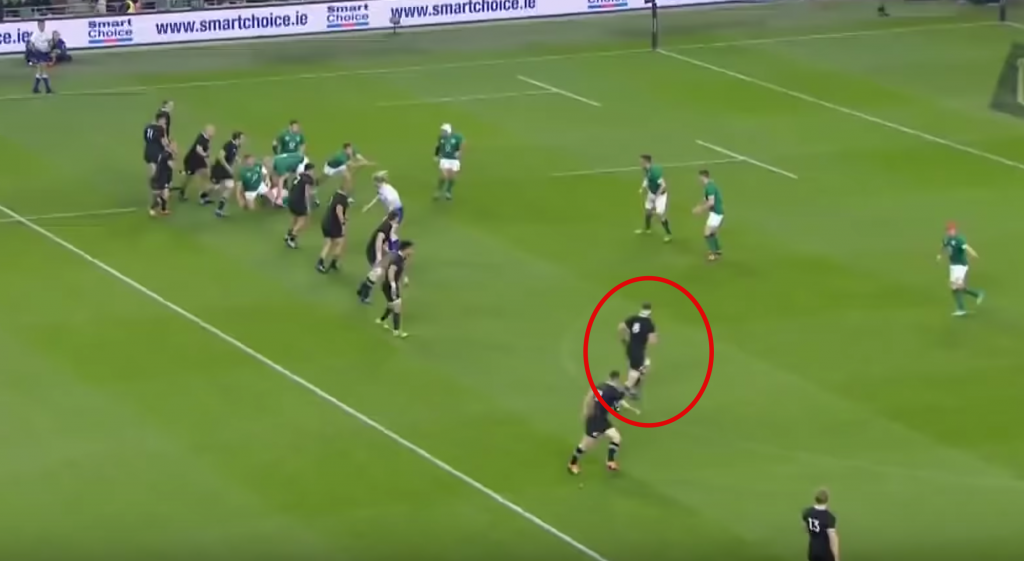
He's three yards offside. Now, that's not Wayne Barnes' fault, he's watching the breakdown and ensuring there's nothing untoward. Likewise, his assistant in shot is watching the blind side. It's the assistant on the near side who should be calling that. Pascal Gauzere and Angus Gardner will be fulfilling these roles on Saturday, and if Ireland are to have any chance of victory, they need that pair to have their voices heard, throughout the game.
But there are ways Ireland can force their hand.
Late in the first half, Ireland used New Zealand's line-speed and indiscipline against them to great effect;
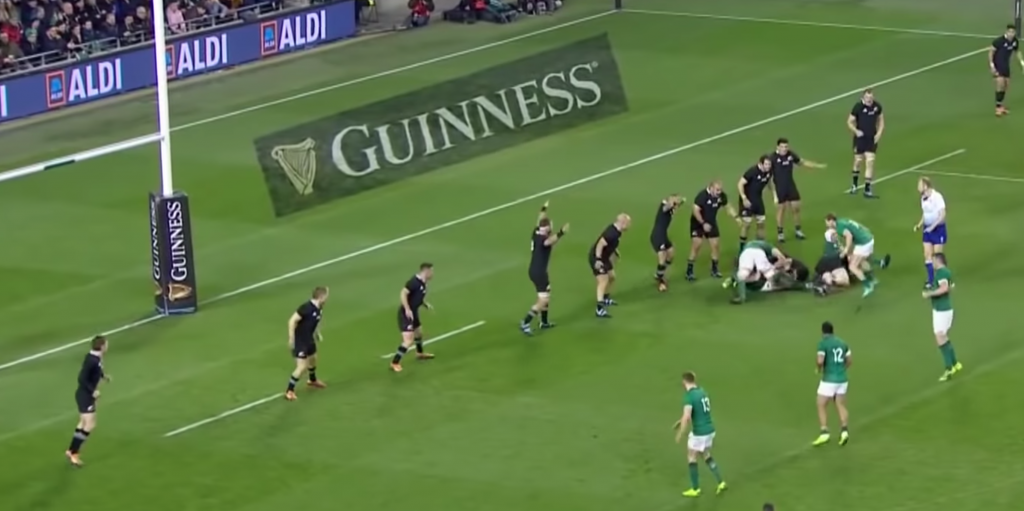
Marmion gets to a ruck just short of New Zealand's 5m line, with Peter O'Mahony, Bundee Aki and Garry Ringrose just outside him. Three strong carriers, New Zealand are ready to pounce as soon as Marmion takes that ball from the ruck.
But he doesn't.
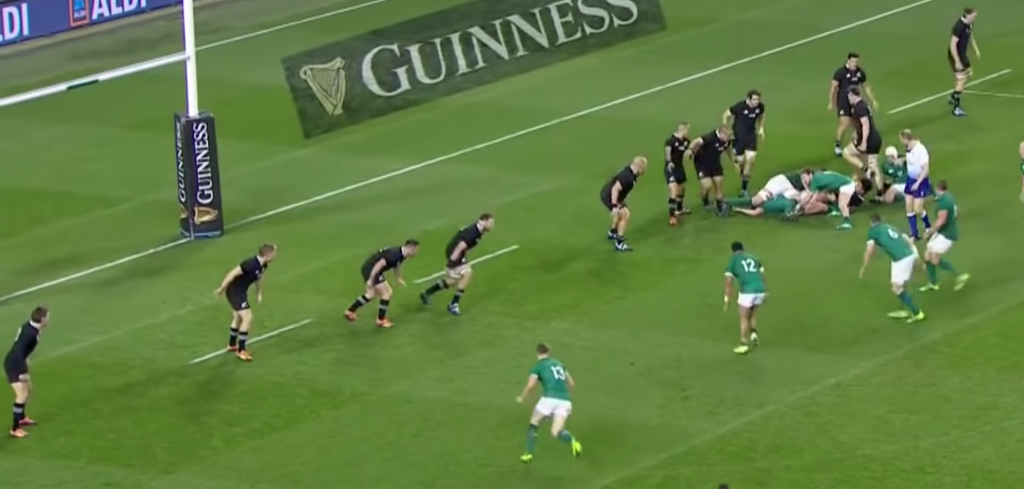
He delays it. There's no dummy, no fake throw, it's not allowed. Nigel Owens is a real stickler for it, and it's not going to work on Saturday.
But, O'Mahony, Aki and Ringrose dummy.
They move up, before the ball is out of the ruck, and instinctively New Zealand do the same.
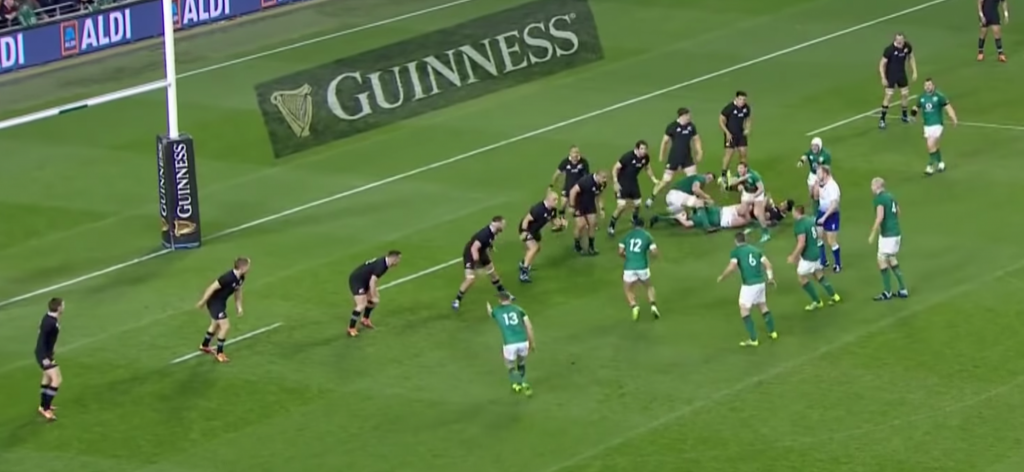
As a result, by the time Marmion actually removes the ball and passes, at least four New Zealand players are a yard offside. Wayne Barnes has no option but to stick out the hand.
Not only does this work in forcing a penalty, it also inhibits future line speeds. It plants a seed of doubt, creates half a second of space. At this level, that's all it takes.
Cards
New Zealand don't do cards. They rarely commit offences that warrant them on their own. Their cynicism is more 'death by a thousand cuts' than the machete-wielding approach of the Samoans in this World Cup, for example.
One of the reasons Ireland dominated the game in 2018 but only won by 7 points, was that New Zealand (illegally) prevented them from scoring tries. Ireland had to huff and puff to take away three points. There were two clear examples of this in the first half alone;
Example 1:
- 21:30 - CJ Stander is tackled high on halfway while breaking by Liam Squire. Ireland kick to the corner.
- 22:49 - Sam Whitelock, offside, deliberately blocks Rory Best's pass. Advantage given.
- 24:01 - Ireland go over the try line, ball held up. 5m scrum Ireland.
- 25:58 - Scrum penalty. Advantage Ireland. An unfortunate knock-on from Rob Kearney sees a great try opportunity wasted.
- 26:10 - Ireland opt for goal
Result: 3 penalties in dangerous positions. 3 points. No cards.
Example 2:
- 34:20 - Rieko Ioane knocks on, Ireland scrum inside New Zealand 22
- 35:25 - Ireland again destroy New Zealand in the scrum, force the penalty and advance to the 5m line.
- 36:00 - Sexton uses his 'free play', crossfield kick to Stockdale is missed, Ireland take the advantage and go to the corner again.
- 37:10 - Kieran Reade is adjudged offside (in above 'dummy' example), advantage given.
- 37:22 - Whitelock takes a nap on the ball, advantage given.
- 37:44 - No advantage accruing, Rory Best opts for the posts. Sexton looks less than pleased.
Result: 3 penalties, all preventing Ireland from scoring a try. 3 points. No cards. One warning.
It shouldn't take 6 penalties, 5 of them inside the 22 and 3 of them cynical for a card to be shown, let alone for that to be the point at which a warning is given. Rory Best as captain will need to be stronger, and in a more open dialogue with Owens, if this kind of behaviour is to be adequately punished on Saturday.
There also needs to be an acceptance that if Ireland have the boot on New Zealand's throat, they can't let up. Would New Zealand have opted for 3 points in either of those occasions?
No.
Twist the knife, force the card, score the try.
Ireland are good enough to do that to New Zealand. This needs to be treated as a game of equals, not a giant-killing exercise.
Calling it out
It's a bugbear of the modern game that when a team repeatedly gives away penalties, the slate is wiped clean if the opposition score. Whereas, if they don't, the card is often given and the try comes anyway. The attacking team is often the one punished, by actually scoring.
New Zealand know this. What should have been 14 points and 2 yellow cards in the above examples became 6 points and 15 men still on the pitch. But, Sexton interestingly took a different approach, and one that Ireland should implement on Saturday;
I've mentioned above the deliberate obstruction by Sam Whitelock in an offside position;
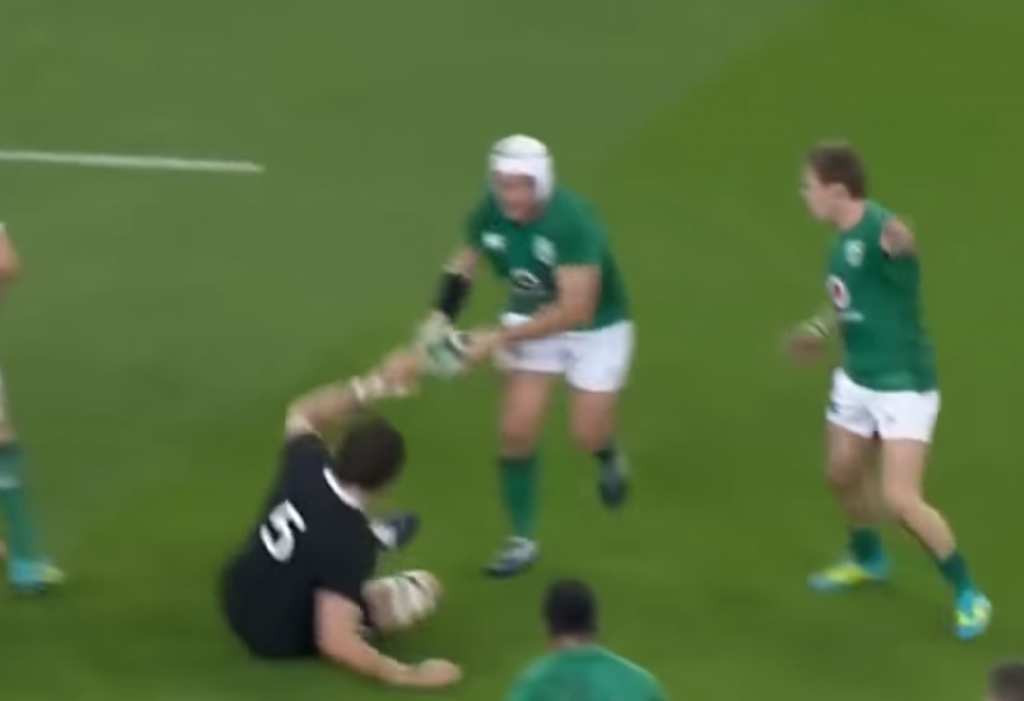
It was so brazen, so deliberate that it seemed to momentarily stun Ireland, who lost all shape. Barnes had awarded Ireland advantage, but Sexton had no interest in seeing what he could do with a free play when Ireland were so disrupted and disorganised.
So he forced Barnes' hand;
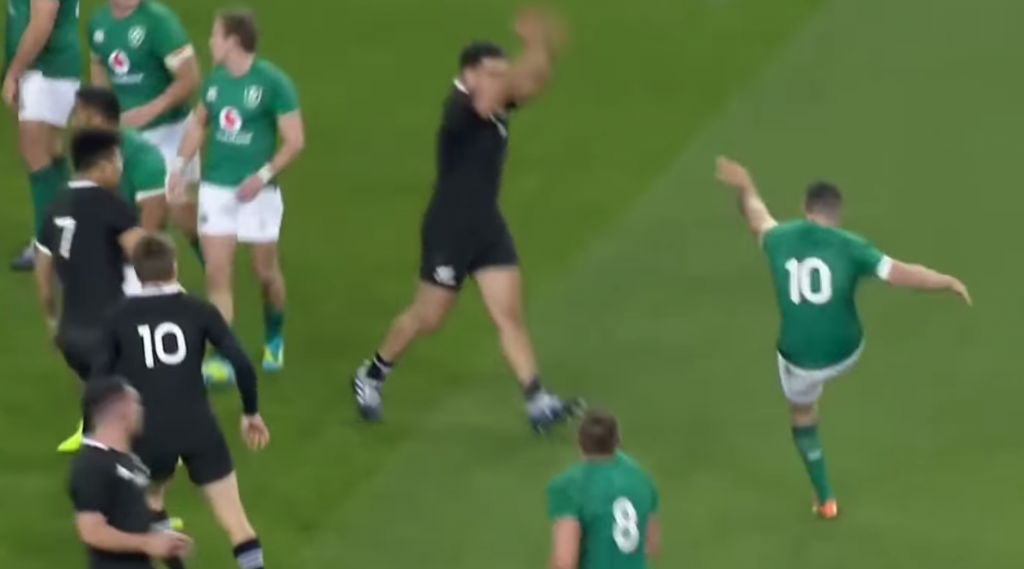
He launched a Garryowen aimlessly a couple of yards behind the New Zealand defence. No chance of winning it, no advantage going to be gained. He may as well have just thrown the ball forwards and glared at Barnes.
The break in play allowed both Rory Best and Peter O'Mahony to speak to Wayne Barnes, question whether it was a card, and underline an act of clear, deliberate cynicism by New Zealand.
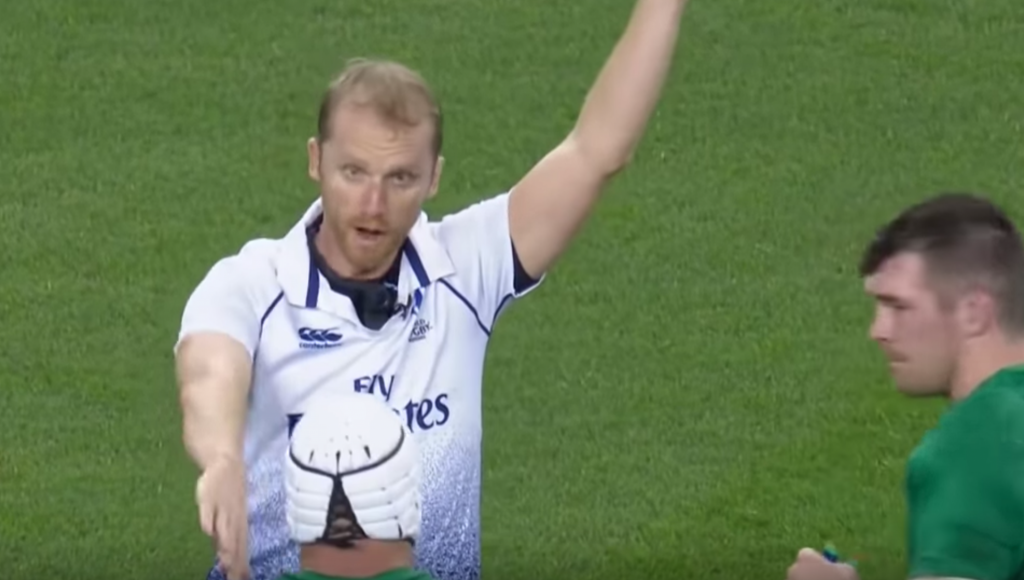
While it didn't work in this game, it's a tactic Ireland should be using more on Saturday.
Break up the play, force Owens hand.
Playing the ref
There's more to come from this Irish side than what we've seen so far. Schmidt has almost a full deck to play from, Ireland have revealed none of their fabled strike plays in the Pool Stages and, for once, they have recent history on their side when they face New Zealand.
But, if they are to complete what would be one of their greatest ever victories, they don't just need to play the game. They need to play the ref.



 He's three yards offside. Now, that's not Wayne Barnes' fault, he's watching the breakdown and ensuring there's nothing untoward. Likewise, his assistant in shot is watching the blind side. It's the assistant on the near side who should be calling that. Pascal Gauzere and Angus Gardner will be fulfilling these roles on Saturday, and if Ireland are to have any chance of victory, they need that pair to have their voices heard, throughout the game.
But there are ways Ireland can force their hand.
Late in the first half, Ireland used New Zealand's line-speed and indiscipline against them to great effect;
He's three yards offside. Now, that's not Wayne Barnes' fault, he's watching the breakdown and ensuring there's nothing untoward. Likewise, his assistant in shot is watching the blind side. It's the assistant on the near side who should be calling that. Pascal Gauzere and Angus Gardner will be fulfilling these roles on Saturday, and if Ireland are to have any chance of victory, they need that pair to have their voices heard, throughout the game.
But there are ways Ireland can force their hand.
Late in the first half, Ireland used New Zealand's line-speed and indiscipline against them to great effect;
 Marmion gets to a ruck just short of New Zealand's 5m line, with Peter O'Mahony, Bundee Aki and Garry Ringrose just outside him. Three strong carriers, New Zealand are ready to pounce as soon as Marmion takes that ball from the ruck.
But he doesn't.
Marmion gets to a ruck just short of New Zealand's 5m line, with Peter O'Mahony, Bundee Aki and Garry Ringrose just outside him. Three strong carriers, New Zealand are ready to pounce as soon as Marmion takes that ball from the ruck.
But he doesn't.
 He delays it. There's no dummy, no fake throw, it's not allowed. Nigel Owens is a real stickler for it, and it's not going to work on Saturday.
But, O'Mahony, Aki and Ringrose dummy.
They move up, before the ball is out of the ruck, and instinctively New Zealand do the same.
He delays it. There's no dummy, no fake throw, it's not allowed. Nigel Owens is a real stickler for it, and it's not going to work on Saturday.
But, O'Mahony, Aki and Ringrose dummy.
They move up, before the ball is out of the ruck, and instinctively New Zealand do the same.
 As a result, by the time Marmion actually removes the ball and passes, at least four New Zealand players are a yard offside. Wayne Barnes has no option but to stick out the hand.
Not only does this work in forcing a penalty, it also inhibits future line speeds. It plants a seed of doubt, creates half a second of space. At this level, that's all it takes.
As a result, by the time Marmion actually removes the ball and passes, at least four New Zealand players are a yard offside. Wayne Barnes has no option but to stick out the hand.
Not only does this work in forcing a penalty, it also inhibits future line speeds. It plants a seed of doubt, creates half a second of space. At this level, that's all it takes.
 It was so brazen, so deliberate that it seemed to momentarily stun Ireland, who lost all shape. Barnes had awarded Ireland advantage, but Sexton had no interest in seeing what he could do with a free play when Ireland were so disrupted and disorganised.
So he forced Barnes' hand;
It was so brazen, so deliberate that it seemed to momentarily stun Ireland, who lost all shape. Barnes had awarded Ireland advantage, but Sexton had no interest in seeing what he could do with a free play when Ireland were so disrupted and disorganised.
So he forced Barnes' hand;
 He launched a Garryowen aimlessly a couple of yards behind the New Zealand defence. No chance of winning it, no advantage going to be gained. He may as well have just thrown the ball forwards and glared at Barnes.
The break in play allowed both Rory Best and Peter O'Mahony to speak to Wayne Barnes, question whether it was a card, and underline an act of clear, deliberate cynicism by New Zealand.
He launched a Garryowen aimlessly a couple of yards behind the New Zealand defence. No chance of winning it, no advantage going to be gained. He may as well have just thrown the ball forwards and glared at Barnes.
The break in play allowed both Rory Best and Peter O'Mahony to speak to Wayne Barnes, question whether it was a card, and underline an act of clear, deliberate cynicism by New Zealand.
 While it didn't work in this game, it's a tactic Ireland should be using more on Saturday.
Break up the play, force Owens hand.
While it didn't work in this game, it's a tactic Ireland should be using more on Saturday.
Break up the play, force Owens hand.